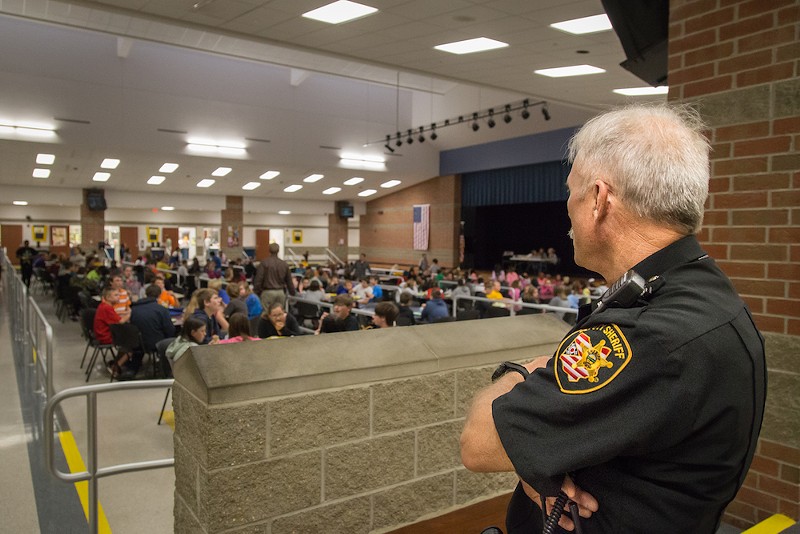
Could increasing police presence throughout Michigan's public schools keep students and staff safe from attacks similar to the one that took place at Oxford High School this week, when a 15-year-old sophomore opened fire on his peers, killing four and injuring seven others?
The Michigan House thinks so, which is why it approved plans to increase the budget for this fiscal year to arm more schools with officers. Considering most schools don't have on-site law enforcement, due to budget cuts and employee shortages, the approved increase would bump the allotted funding from $10 million to $50 million, Bridge Michigan reports. The increase reflects just a portion of a $369 million police-related spending bill that is headed to the Senate for approval.
Though it is unclear as to how far $50 million could go in terms of hiring additional officers, Bridge Michigan estimates that 625 new resource officers could be distributed across 3,885 Michigan school buildings, based on an $80,000 salary and benefits per officer.
Rep. Gary Howell told Bridge Michigan that the funding increase was directly related to the events of this week's shooting. Howell's son is a teacher at Oxford High School and followed active shooter protocol by barricading the door in an effort to protect his class.
"That was obviously the catalyst for me to think about how can we assist other school districts to have that kind of potential protection," Howell said, adding, "We now know — we always knew, but now it's really dramatic — that a school resource officer can make a very significant difference when one of these horrible events happens."
Howell also said that though there are other actions the Michigan legislature could take, the police appropriations bill is "probably the most immediate, direct thing" they can do.
Thursday's vote resulted in a 97-3 approval with Republican representatives Steve Johnson, Steve Carra, and John Reilly voting against it.
According to police, it was a sheriff's deputy that was regularly stationed at Oxford High School who was able to confront the shooter before he could tap into the 18 unused rounds of ammunition he had on his person at the time he was apprehended. Michigan representatives hope that more police on school grounds means swift and potentially life-saving actions against threats to safety.
Though some praise school resource officers and the multifaceted work they do beyond patrol hallways and lunchrooms, critics of police in schools cite the school-to-prison pipeline, as schools with law enforcement present tend to have higher arrest and suspension rates.
Recent studies suggest that schools with police are less safe, especially for children of color. After the killing of George Floyd, an unarmed Black man who died at the hands of Minneapolis police in 2020, sparking months of protest and calls for police reform, districts in Minneapolis, Seattle, and Portland vowed to pull police from schools. In Denver, the board of education voted unanimously to dissolve their police contract.
The Seattle superintendent said at the time that the presence of armed police officers "prohibits many students and staff from feeling fully safe."
"It’s not as simple as to say this solves the problem, because it doesn’t," Robert McCann, executive director of K12 Alliance of Michigan told Bridge Michigan.
He added that though a school resource officer "helped bring a quick end to what happened (in Oxford), but at the end of the day, it didn’t stop it, either."
McCann believes that a more effective solution in preventing shootings and other safety concerns might be to increase the number of mental health professionals at schools.
"We have to look at this as a holistic problem that needs a holistic approach," he said. "We have to stop looking at these things as a school security problem, it’s a societal problem."
Stay connected with Detroit Metro Times. Subscribe to our newsletters, and follow us on Google News, Apple News, Twitter, Facebook, Instagram, or Reddit.

